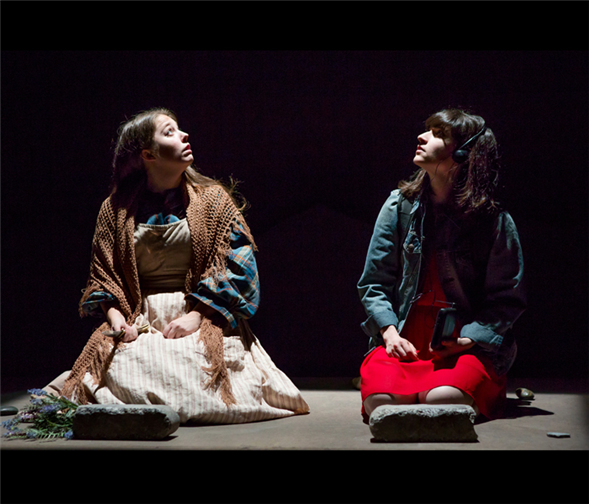Life Is Hard, But At Least You’re Not a Pioneer
Home > TDF Stages > Life Is Hard, But At Least You’re Not a Pioneer

A new play blends covered wagons and modern technology
—
You’ve named your travel companions, chosen an occupation, and sensibly spent $400 at the general store on oxen, food, ammunition, and winter clothing. You set off west from Independence, Missouri, ready for an adventure. And then – whoops – you get a message on your screen that says you’ve died of dysentery. So it goes in The Oregon Trail.
Anyone who had a computer in the 80s or 90s is likely to remember this particular game, where players tried to get a group of settlers safely across the country in 1848. Half the fun – and more than half the point – came from the difficulty in completing the journey. No matter how much you prepared, the game insisted, life was always going to be hard.
That theme has transferred from the monitor to the stage in Bekah Brunstetter’s new play, also called The Oregon Trail. Presented by the Fault Line Theatre and now in performances at the WP Theater until February 12, it juxtaposes pioneer life with the modern day.
“At the time when I started really working on this [script], I was seeing, in my peer group, a lot of sadness,” Brunstetter says. “This feeling of listlessness and a sense of feeling lost and not quite knowing we’re on the earth and what our function is, which of course is a common thing in your twenties. The play is about where that feeling comes from and how we deal with it and how that has changed between 1848 and now.”
Within the show, the audience meets two Janes. There’s Then Jane (played by Emily Louise Perkins), who is travelling the trail, covered wagon and all, alongside her family. There’s also Jane (Liba Vaynberg), a contemporary teenager. When we meet them, both girls are unhappy with their lot in life, struggling to understand their place, and dealing with their own sadness and frustration.
Even as present-day Jane enters her mid-20s, the perils both women face, however different, leave them in similar emotional states. Then Jane battles the frontier, while Jane finds herself unemployed and trying to get a handle on her depression.
“I thought it would be interesting to compare feeling that way now versus feeling that way on the Oregon Trail,” the playwright says. “If you’re on the trail with your family, where every day is a fight to survive, you can’t say that you don’t want to get out of the wagon in the morning. You kind of have to.”
One scene in particular underscores the emotional intersections between the characters. Jane, nestled under a mound of blankets in an air-conditioned apartment, has been lying around binge-watching some show (probably Planet Earth or America’s Next Top Model, according to Brunstetter). After six hours, she’s feeling unfulfilled, uninspired, lazy, and sad. All of the emotions, Brunstetter notes, one often feels after lying around for half a day. (There’s even a study that suggests binge watching is bad for your mental state.) Meanwhile, Then Jane has been tasked with starting a fire so that her family can eat breakfast. Unable to light the fire, she feels useless and discouraged.
“They’re both frustrated,” Brunstetter says. “The scope of their individual frustration cannot be more different: ‘I need to light this fire so that my family can eat’ versus ‘I don’t know what to do with this moment of my life that’s been gifted to me.’ My goal is to compare those two.”
However, it is not Brunstetter’s wish to cast judgement on either one of the women, particularly present-day Jane, whose situation is obviously less dire. “Though we’re not necessarily hunting for our food and lighting fires for it, there’s still a place for sadness because we’re human beings,” she says. “And even though our lives are easier, it’s going to be a part of the experience.”
After all, the playwright adds, it’s our ancestors—including the ones who’ve trekked the trail—that have allowed us access to an easier life. If we remember that as we play the game, the journey can be much more satisfying.
—
Follow Josh Austin at @TheJoshAust. Follow TDF at @TDFNYC.
Photos by Jeremy Daniel. Top photo (L to R): Emily Louise Perkins and Liba Vaynberg.
TDF Members: Go here to browse our discounts to theatre, dance, and concerts.
